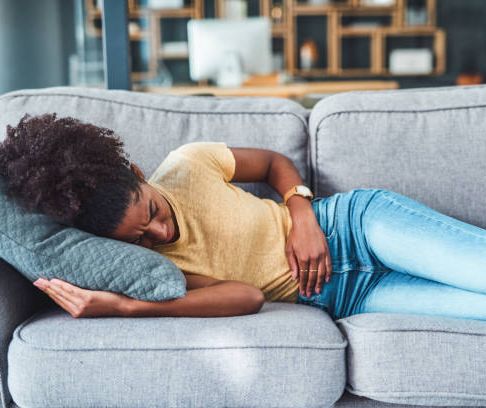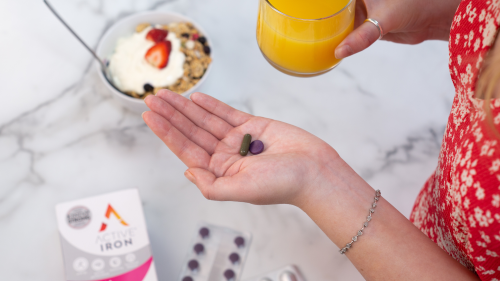
New survey spotlights Endometriosis Awareness month
“Endometriosis symptoms are hugely debilitating, alongside the underestimated social and psychological burden of managing them,” Dr Ria Clarke, Specialist Registrar in Obstetrics and Gynaecology, says of the impact of the condition, which has pain, heavy periods and fatigue among its symptoms.
Endometriosis Awareness Month is in March, and Irish supplement brand, Active Iron, has released survey findings that chart the everyday struggle of the condition for women. The research showed that the stressful physical impacts of endometriosis and heavy periods compounded to affect the mental health and interpersonal relationships of the 1,500 women surveyed across Ireland, the UK and the US.
From choosing certain clothes, to socialising, relationships, attending work or school, and doing physical exercise, the survey reveals how pain, heavy menstrual bleeding and fatigue frequently lead to withdrawal from normal activities.
While pain is the most common symptom of endometriosis, the aim of the awareness campaign is to spotlight the lesser-known impacts of endometriosis, such as heavy periods and fatigue.
The intention is to help start conversations, and break the stigma around menstrual health, and its intrinsic ties to women's wellbeing, Claire Lynch, Head of Marketing for the Irish company producing Active Iron, says.
- 81% of the Irish women with endometriosis who were surveyed experience heavy periods. Notably, 87% of Irish women surveyed, who do not have endometriosis, said heavy menstrual bleeding has a negative impact on their quality of life too. 71% experience a noticeable difference in their ability to function normally during their period.
- 56% of all women surveyed feel isolated or alone, when dealing with fatigue related to heavy bleeding, and 55% reported feeling uninterested and lethargic; for example not wanting to see people or go out. 51% of women reported not wanting to talk to friends and family, and, emotionally, 48% described themselves as feeling unhappy, sad or depressed.
- Common challenges for endometriosis sufferers and those experiencing heavy blood loss (menorrhagia) are stigma, diminished quality of life on account of pain and fatigue, and delay in diagnosis. Endometriosis sufferers wait on average 7.5 years before being diagnosed, and many with menorrhagia may not even seek medical help, as they assume heavy bleeding is normal.

Awareness
79% of those surveyed say more should be done to raise general awareness of the potential effects on women who experience heavy periods. However, over half of women, 55%, state that they feel problem periods are just a part of being a woman, despite the negative impacts on their quality of life.
Supporting the Active Iron campaign, Dr Sarah Murphy of St James’s Hospital, Dublin, said women don't have to just accept heavy periods as a normal part of being female.
“If challenged with managing menstrual pain and fatigue, and not happy with the endometriosis advice or treatment from medical professionals, women do have options. Firstly, they can insist their practitioner orders all appropriate tests, and advises them on all treatments available to ease symptoms, from pain relief to surgery. And, secondly, iron supplementation will help with the fatigue that exacerbates low mood, lethargy and other symptoms.”
52% of the women surveyed had been given pain medication to treat endometriosis, while 47% were recommended contraception, and 23% have been prescribed other hormone therapies.
“By advocating for more awareness of endometriosis, and better ways to manage pain and heavy menstrual bleeding, we can achieve symptomatic relief, improve quality of life, and empower women to take control of their health and wellbeing”, the obs and gynae special registrar says.
40% of survey respondents consume more coffee or energy drinks to give themselves an energy lift during their menstrual cycle, and to manage tiredness and fatigue.
Sleeping more (54%) and ‘doing less activities’ (50%) are the other main ways women try to manage this fatigue, although 41% find these solutions ‘not very effective’.
Rather than covering up tiredness and fatigue with quick fixes, a daily iron supplement can help women restore the energy loss associated with diminished iron, Claire Lynch of Active Iron, says.
“Heavy periods are the main cause of iron deficiency in women of child-bearing age. Maintaining optimal iron levels in the blood is vital, in particular for those with endometriosis who experience heavy periods. Iron supplementation can help support and maintain iron levels.”
Many iron supplements are poorly tolerated, leading to side effects like nausea, constipation and changed bowel habits. This often causes women to discontinue them, reducing the chance of improving their iron stores and resulting energy levels.
In contrast, Active Iron has a highly effective and tolerable formula, Claire Lynch says.
“Active Iron is clinically proven to increase iron levels by 94%, while avoiding troublesome side effects, giving more energy, an enhanced quality of life in the long term, and better overall health.”






